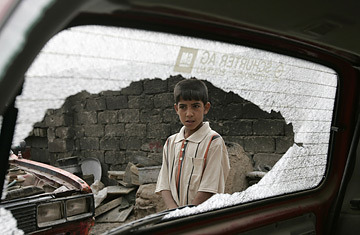
A boy stands near a shattered window of a damaged vehicle after a U.S. airstrike in Baghdad.
A charade is going on in Baghdad and it may end badly. The U.S. military has been very careful to say that the current offensive by the Iraqi government in southern Iraq was simply "enforcement of the law in Basra." It was not directed against the Mahdi Army, the militia run by radical Shi'ite cleric (and political powerhouse) Moqtada al-Sadr, whose seven-month-old cease-fire has been key to the success of the American surge. The U.S. maintained that line today even though it was clear that the "criminal gangs" battling government forces in Basra were identifiable as elements of the Mahdi Army. In a military briefing in Baghdad on Wednesday, the U.S. military spokesman Maj. Gen. Kevin J. Bergner continued to define the Mahdi Army as those parts of it that observe the cease-fire while those that ignore it were referred to as criminal elements.
Bergner said the U.S. was showing "restraint" in its actions against militants in Baghdad, saying it was directing its efforts against "criminals who dishonor Sadr's pledge of honor." Sadr's Mahdi Army, though, has always reserved the right to defend itself, raising the question of whether mainstream elements of the militia were standing and fighting in Basra without officially rejecting Sadr's directive.
The larger question, though, is how many "criminal elements" can ignore the cease-fire before the cease-fire becomes meaningless as a practical matter. Even as Bergner characterized the fight as a battle between the Iraqi government and "criminals," rockets launched from the militia's Sadr City stronghold poured into the Green Zone for the fourth straight day.
Three American civilians in the Zone were seriously wounded in Wednesday's attacks. Throughout the day and into the evening the sound of mortars landing inside the compound boomed through Baghdad, a reminder of the militia's power to ratchet up its attacks if the cease-fire continues to fray.
So far the U.S. has mostly stayed out of the fighting, preferring to let the Iraqi government and Iraqi troops take the lead. Bergner would not comment on whether the Americans would become involved more directly if the Iraqi government could not complete its Basra operation. "I would say," he said, "that's a very hypothetical question at this time."
It is also the question of the hour. If the violence continues to intensify and the Iraqi government cannot finish what it started then the U.S. must choose whether to throw its troops into the fight. If that happens then the seven-month cease-fire, which was vital to the dramatic drop in violence late last year, will truly be over and a new round of bloodletting may be about to begin.
